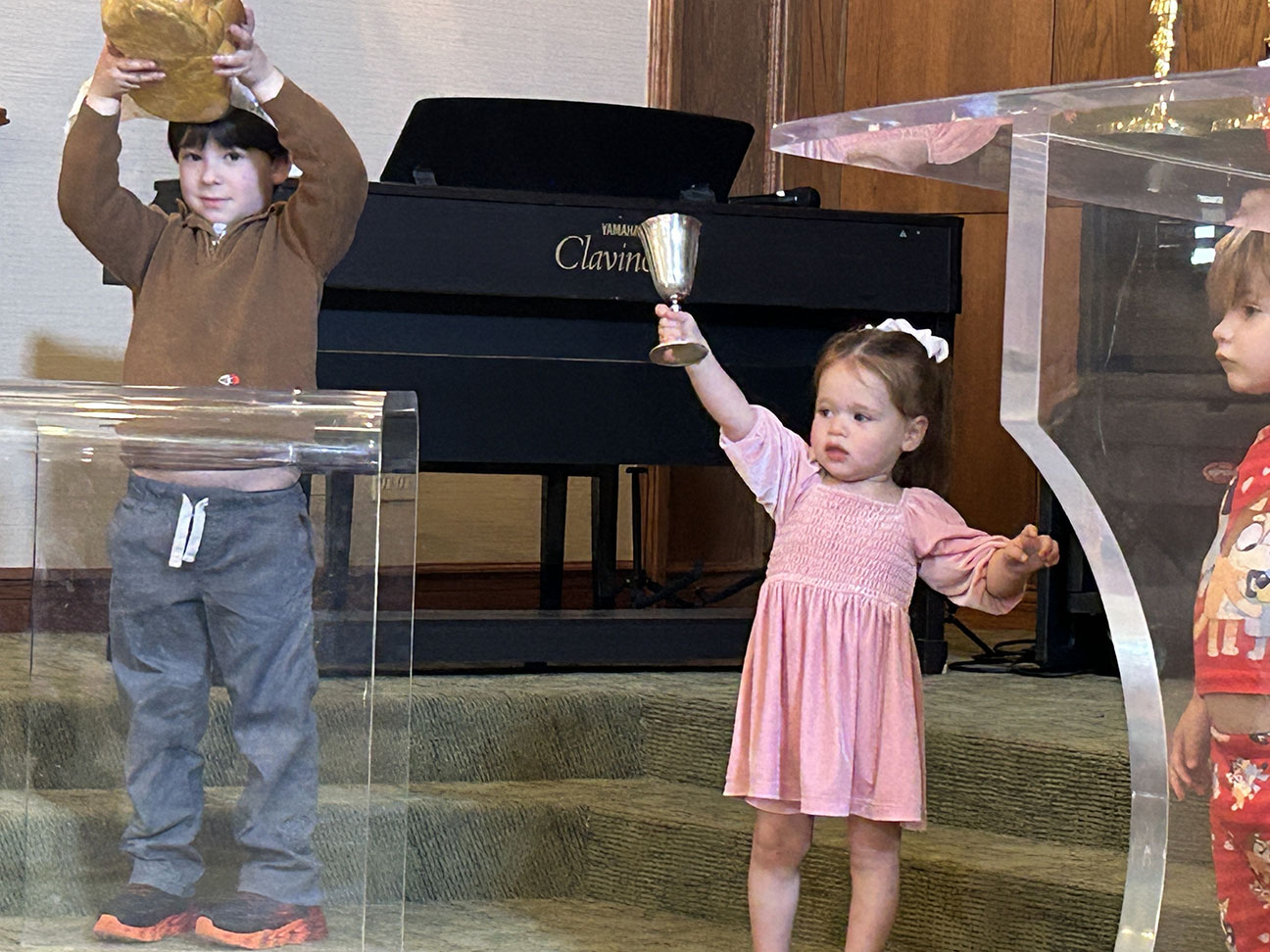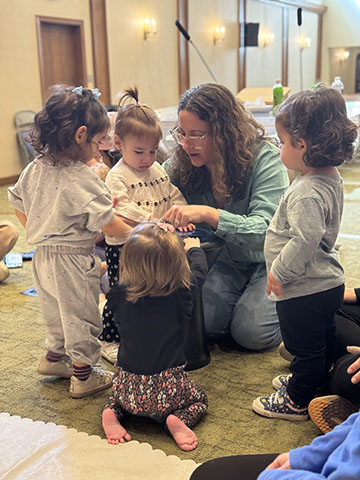
Shortly after her home in Pacific Palisades was destroyed in the fire, Emily Kane Miller, founder and CEO of Ethos Giving, was already thinking about how she could help. While her entire neighborhood was struggling to find housing and come to terms with an uncertain future, Miller was on the phone with the Jewish Federation of Greater Los Angeles (JFEDLA), working on a plan to support the Jewish community.
That plan became the HUG Fund — short for “Helping Uplift Generations” — a multimillion-dollar initiative offering tangible support to local Jewish families trying to rebuild their lives. The fund aims to ease the burden of recovery by covering half the cost of Jewish preschool tuition and summer camp for families affected by the fires.

Miller and JFEDLA identified two key areas they wanted to support: early childhood education and Jewish summer experiences. These are essential to maintaining a sense of stability, connection and continuity during times of crisis, yet they’re often overlooked as families deal with more immediate needs.
Launched in late March with a heartfelt Instagram video from actress and advocate Mayim Bialik, the HUG Fund is already gaining attention and support, offering fire-impacted families a way to begin looking toward the future with cautious optimism.
Miller said she found a tremendous partner in JFEDLA President and CEO Rabbi Noah Farkas to roll out the initiative as part of JFEDLA’s larger Wildfire Crisis Relief Fund. The broader fund provides essential ongoing resources, including mental health support, warm meals, shelter and safe space for displaced individuals, families and institutions.
 “When disaster strikes, it can alter life trajectories and weaken communal bonds,” said Farkas. “This strategic fund is designed to address the urgent needs of Jewish families and uphold our collective commitment to Jewish life as a valuable cornerstone that supports our families to rebuild with dignity, resilience and hope.”
“When disaster strikes, it can alter life trajectories and weaken communal bonds,” said Farkas. “This strategic fund is designed to address the urgent needs of Jewish families and uphold our collective commitment to Jewish life as a valuable cornerstone that supports our families to rebuild with dignity, resilience and hope.”
According to CalFire, the combined area damaged by the Palisades and Eaton fires exceeded 63 square miles — larger than the total area of Washington, D.C. and three times the size of Manhattan. More than 16,000 buildings were destroyed and nearly 30 lives were lost.
The blazes hit the Jewish community particularly hard. Based on initial survey data collected from synagogues, approximately 1,000 families either lost their homes or had them deemed uninhabitable. Synagogues in both the Palisades and Pasadena were severely affected, temporarily displacing entire congregations.
In a recent open letter published in the LA Times, Farkas reflected on the equalizing force of a natural disaster:
“Fire’s purpose, if it can be said to have one, is to reduce complex matter to the most basic of elements,” he wrote. “The fire has done the same for all of us. Whether we live in Pacific Palisades, Altadena, or anywhere in between, the suffering and subsequent outpouring of love produced by these tragic events broke down our differences and taught us that we are all made of the same grist.”
In a phone interview with The Journal, Miller said she wanted to create maximum benefit for the community. The name HUG, she explained, came simply from wanting to give those families a warm and encouraging hug.
“We wanted to make it easier on families who had lost so much. I wanted to create a fund that would be meaningful for our community, but one that not only benefits them and their children today, but also for the rest of their lives,” said Miller.
“We wanted to make it easier on families who had lost so much. I wanted to create a fund that would be meaningful for our community, but one that not only benefits them and their children today, but also for the rest of their lives” – Emily Kane Miller
The HUG Fund will provide tuition reductions for Jewish early childhood centers and Jewish overnight summer camps not only to help preserve Jewish life, but also in the hope of welcoming new families into the community — regardless of their prior involvement. This way, families who hadn’t previously enrolled their children in Jewish programs can now offer them this meaningful experience.
“As a kid who grew up going to summer camp myself and as a mom to kids who are going to Jewish summer camps, I just know in my bones that this is the kind of place that will help kids feel joy and warmth,” said Miller. “For families who lost their homes in the fire, this is a home away from home. We know how impactful those are for Jewish life, spirituality and continuity, and we felt that it makes a huge difference today — but also creates stability and real groundwork for those families to truly move forward with strength.”
Rabbi Daniel Sher of Kehillat Israel in the Palisades, whose community was severely impacted by the fires, said he is deeply grateful for the fund, which will benefit many in his congregation. While the synagogue itself wasn’t damaged, many of the families who sent their children to the preschool there were forced to evacuate. The school is now operating out of Beth Shir Shalom in Santa Monica.
 “Of the kids in the preschool, 40% don’t live in the area anymore. We have some who are driving all the way from Manhattan Beach, Beverly Hills and the Valley because they want to stay connected to the community, but some just can’t make it work,” said Sher.
“Of the kids in the preschool, 40% don’t live in the area anymore. We have some who are driving all the way from Manhattan Beach, Beverly Hills and the Valley because they want to stay connected to the community, but some just can’t make it work,” said Sher.
The tuition assistance being offered to those families, he said, could be a game-changer in helping them decide where to rent. “If they want to stay close to their children’s Jewish school, that would allow them to do so more easily,” he said.
JFEDLA also offers the One Happy Camper fund and working with the HUG Fund, families affected by the fires will be eligible for a 75% discount on overnight summer camp tuition. “These are exactly what our community needs right now. We don’t want families to have to choose whether or not to send their kids to camp,” Miller said.
“When people talk about something being ‘unprecedented,’ they often mean the dramatic beginning,” said Sher. “But the real unprecedented part is the healing. The ripple effect to the Jewish community and our synagogue is going to be tremendous. They’ve created a way to make the healthiest, best choice for the Jewish community. As a rabbi, I’m profoundly moved that we have this infrastructure in place to help families who have experienced trauma feel compassion and support in this way — and that has an incredibly healing factor.”

































 More news and opinions than at a Shabbat dinner, right in your inbox.
More news and opinions than at a Shabbat dinner, right in your inbox.